Early childhood Jewish education (ECJE) is critical for developing minds, engaging young Jewish families, and ensuring the Jewish community’s health today and in the future. For ECJE to succeed, the field needs to urgently address the shortage of early childhood educators, while also resourcing and supporting them throughout their careers. ElevatEd, a groundbreaking collaborative initiative from JCC Association of North America, Jewish Federations of North America, and the Union for Reform Judaism, aims to transform ECJE with a far-reaching strategy to attract, train, and support more educators in the field. In the new initiative, known formerly as Project-412, these three prominent Jewish organizations will collaborate with funders, practitioners, educators, and community leaders to address the critical educator shortage and work to expand the field of early childhood Jewish education in North America.
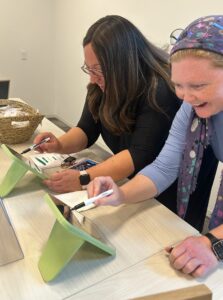
ECJE director and teacher at the ElevatEd educator reception in Houston, Sept 6.
In total, the JCC Movement and Reform Movement operate 475 early childhood centers serving more than 65,000 young children and their families across the country. Tens of thousands more remain on long waiting lists or simply choose not to even try due to the shortage of educators. The three-year ElevatEd pilot will focus on 14 pioneer communities across 14 states, with a goal of recruiting, training, and credentialing up to 30 educators in each community, amounting to more than 400 emerging early childhood educators in total. ElevatEd launched in the summer of 2023 with five initial communities: Boston, Massachusetts; Denver-Boulder, Colorado; East Bay, California; Houston, Texas; and Long Island, New York. With these new educators, ElevatEd hopes to leverage ECJE as a driver of deeper and longer-term family engagement in meaningful Jewish life. The educators will work in JCCs, synagogues across all denominations, and a diverse collection of other Jewish educational settings that reflect the unique demographic makeup of their area.
CJP is incredibly proud to join several other Federations in supporting ElevatEd on a local level. In Boston, we believe that a focus on families with young children has the potential to transform our communities and a critical component of this work is support for early childhood education and educators. Together with our early childhood education partners, we are working to identify and tackle challenges and make the most of important opportunities such as this one. We are tremendously excited about ElevatEd’s new approach to boosting early childhood Jewish education and look forward to all of the benefits it will bring young families and our community.
– Marc Baker, President and CEO of Combined Jewish Philanthropies (CJP), Boston’s Jewish Federation
With the new school year underway, participating emerging educators in cohort one will soon start their year of learning, 18 months of mentorship support, and will receive funds to support their work toward a credential in early childhood education. Equally important, mid-career educators in each ElevatEd school also receive a stipend and will participate in a research-based mentor training program in partnership with the Jewish New Teacher Project to support the emerging educators in their schools.
The second cohort of communities will launch in early 2024 and help cement the long-term model for improving ECJE and making it more widely available. Each pioneer community will pair their own funding alongside a substantial initial investment from philanthropic foundations, which will build a long-term financial model for improvement and growth. To provide the foundation for the year of learning, ElevatEd is partnering with nationally recognized educational experts, Teaching Beyond the Square and the K’ilu Company, for the general and Judaic studies framework for emerging educators, respectively.
We need a national strategy to address systemic challenges in the early childhood Jewish landscape, which is why we are excited to launch ElevatEd, a groundbreaking partnership to address these issues on a national scale in the Jewish community.
– Sasha Kopp, senior director of education and engagement, ElevatEd
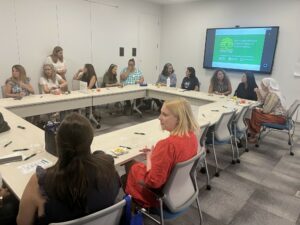
ElevatEd teacher reception in Houston, Sept. 6
The launch of ElevatED is an ambitious and timely development for ECJE that reflects the urgent, large-scale needs of the field. Early childhood Jewish educators are integral to thriving Jewish life–they nurture children, families, and their Jewish communities. With this expansive effort to recruit, train, credential, and mentor ECJE educators, more families will have opportunities to engage in Jewish communal life.
This collaborative approach among national partners, national and local funders, and key stakeholders in each local community also reflects a powerful, shared vision of meaningful ECJE accessible to all. To shed light on the program’s impact, Rosov Consulting will measure its outcomes. Through iteration and experimentation, ElevatEd plans to use this pilot phase to become a long-term model for the growth of ECJE and for powerful ECJE experiences led by talented educators.
ElevatEd is a pilot initiative funded by the Jim Joseph Foundation, Crown Family Philanthropies, and the Samuels Family Foundation, as well as from local Federations, foundations, and local philanthropists in each pioneer community. Visit elevatedtogether.org for more information.
Top picture: Representatives from Houston’s JCC, Federation, and the URJ at ElevatEd’s first retreat Sept. 6 discussed how to leverage the time that families spend in ECJE to connect them deeply with the greater Houston Jewish community for lifelong engagement and learning.
 Sephardi and Mizrahi lens. The online quarterly publication offers fresh and impactful content that elevates the perspectives and raises the profile of Sephardi and Mizrahi people and communities.
Sephardi and Mizrahi lens. The online quarterly publication offers fresh and impactful content that elevates the perspectives and raises the profile of Sephardi and Mizrahi people and communities. 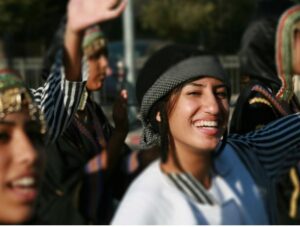 JIMENA also has undertaken
JIMENA also has undertaken 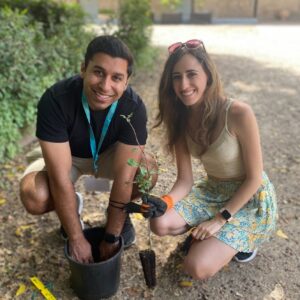 information for the field. More than 80,000 people come to Israel each year through IETA partner organizations, representing different age cohorts, target audiences, and travel experiences. Of course the common link is each partner’s dedication to Israel educational travel.
information for the field. More than 80,000 people come to Israel each year through IETA partner organizations, representing different age cohorts, target audiences, and travel experiences. Of course the common link is each partner’s dedication to Israel educational travel.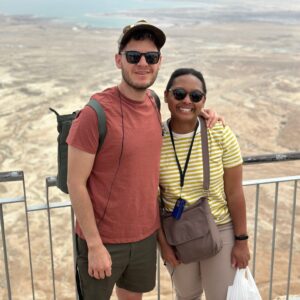 Prior to COVID, there was little cross-communication other than through professional friendships we might have had or through other meetings convened for those of us working in the field of Jewish engagement. As a coalition we have created a field of practice as professionals. We can focus on looking forward to how we work with the government of Israel, advocating a policy to support travel, funding training across the field and building up the infrastructure needed to insure our success.
Prior to COVID, there was little cross-communication other than through professional friendships we might have had or through other meetings convened for those of us working in the field of Jewish engagement. As a coalition we have created a field of practice as professionals. We can focus on looking forward to how we work with the government of Israel, advocating a policy to support travel, funding training across the field and building up the infrastructure needed to insure our success. These reports and tools are used by communities, foundations, and individual schools to optimize efficiency and maximize potential, often making a direct impact on decision-making. In one case, a school leader who was struggling to recruit new teachers accessed data from DASL (Data and Analysis for School Leadership), Prizmah’s financial and operational benchmarking tool, and realized that her school’s compensation structure put them on the very low end in the marketplace. Recognizing the impact this had on their ability to recruit talented educators, this leader and her board made the decision to increase teacher salaries.
These reports and tools are used by communities, foundations, and individual schools to optimize efficiency and maximize potential, often making a direct impact on decision-making. In one case, a school leader who was struggling to recruit new teachers accessed data from DASL (Data and Analysis for School Leadership), Prizmah’s financial and operational benchmarking tool, and realized that her school’s compensation structure put them on the very low end in the marketplace. Recognizing the impact this had on their ability to recruit talented educators, this leader and her board made the decision to increase teacher salaries.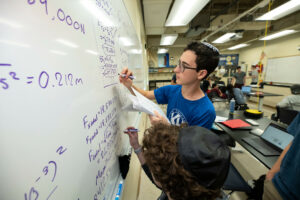 champions the use of data by schools, the organization itself make research and data a critical part of its operations.
champions the use of data by schools, the organization itself make research and data a critical part of its operations.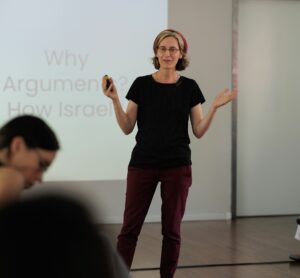 meaningful ways. Its book
meaningful ways. Its book 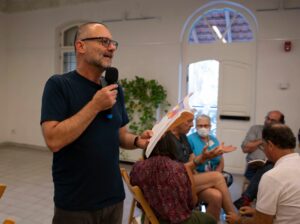 FSA offers many ways for educators and leaders to learn about this approach to education. A 90-minute introductory workshop models the FSA framework and tools, and in-depth courses for professionals provide a deeper mastery of engaging with contentious issues. FSA’s open
FSA offers many ways for educators and leaders to learn about this approach to education. A 90-minute introductory workshop models the FSA framework and tools, and in-depth courses for professionals provide a deeper mastery of engaging with contentious issues. FSA’s open 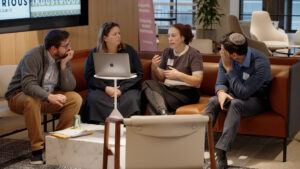 JNTP offers two core programs—drawn from New Teacher Center’s research-based and field-tested work—that strengthen teaching, learning, and educational leadership. Its intensive Teacher Induction Program pairs new teachers with veteran teacher mentors for weekly mentoring conversations and classroom observations, utilizing a research-based and field-tested mentoring methodology and tools developed to improve teacher growth. JNTP’s Administrator Support Program helps early-career school leaders grow into their leadership roles through cohort-based learning and individualized coaching focused on leadership, culture, and supervision. Program participants develop into effective, quality teachers and school administrators with skills and support to create “Optimal Learning Environments,” in which students thrive through learning and social-emotional growth.
JNTP offers two core programs—drawn from New Teacher Center’s research-based and field-tested work—that strengthen teaching, learning, and educational leadership. Its intensive Teacher Induction Program pairs new teachers with veteran teacher mentors for weekly mentoring conversations and classroom observations, utilizing a research-based and field-tested mentoring methodology and tools developed to improve teacher growth. JNTP’s Administrator Support Program helps early-career school leaders grow into their leadership roles through cohort-based learning and individualized coaching focused on leadership, culture, and supervision. Program participants develop into effective, quality teachers and school administrators with skills and support to create “Optimal Learning Environments,” in which students thrive through learning and social-emotional growth. 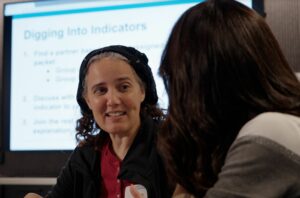 seed funding from The AVI CHAI Foundation to launch as an offering of the New Teacher Center in Santa Cruz, CA.
seed funding from The AVI CHAI Foundation to launch as an offering of the New Teacher Center in Santa Cruz, CA. 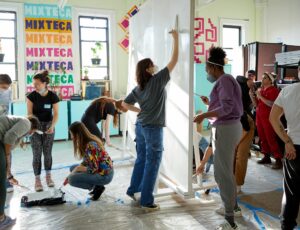
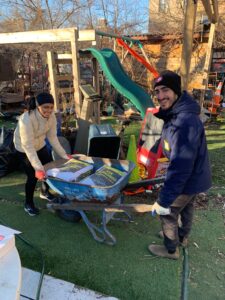 delivering Jewish service-learning content. One new resource for staff is the Repair Facilitator’s Toolkit, a 38-card deck of “grab and go” cards that equip facilitators with key resources to connect participants to Jewish service. This toolkit includes a series of “core tensions” cards that help to engage with the broader landscape of questions and considerations that arise when people participate in direct service. Repair explicitly leans into these core tensions, such as tradition vs. renewal, to deepen participants’ connection to their service and Jewish values.
delivering Jewish service-learning content. One new resource for staff is the Repair Facilitator’s Toolkit, a 38-card deck of “grab and go” cards that equip facilitators with key resources to connect participants to Jewish service. This toolkit includes a series of “core tensions” cards that help to engage with the broader landscape of questions and considerations that arise when people participate in direct service. Repair explicitly leans into these core tensions, such as tradition vs. renewal, to deepen participants’ connection to their service and Jewish values.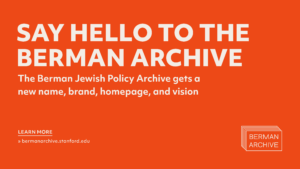

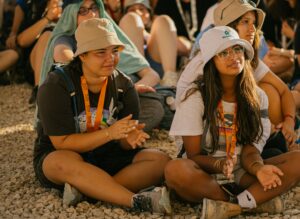
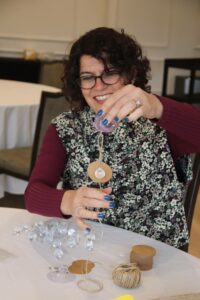 Understanding these initial human responses,
Understanding these initial human responses, 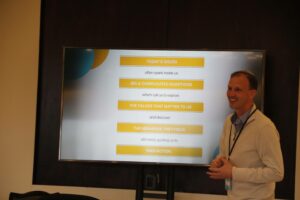 first organizational partner, and then introducing a second organizational partner in early 2023. M²
first organizational partner, and then introducing a second organizational partner in early 2023. M² Jewish educational goals without worrying about experiencing racism. Hebrew classes give members
Jewish educational goals without worrying about experiencing racism. Hebrew classes give members